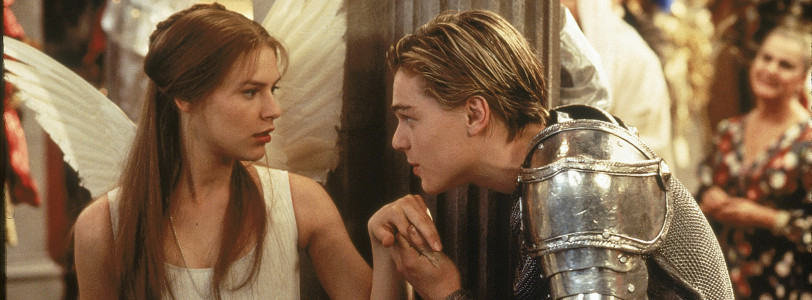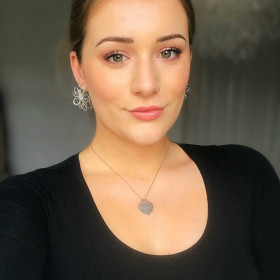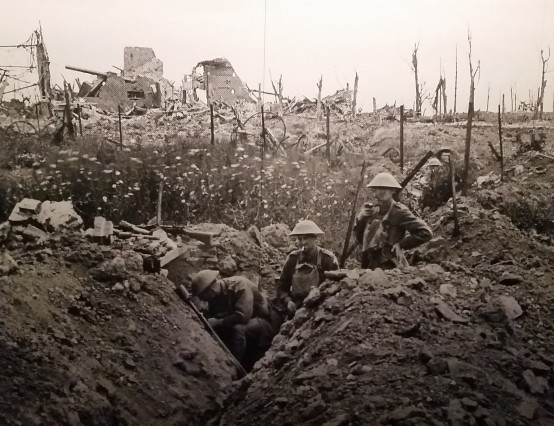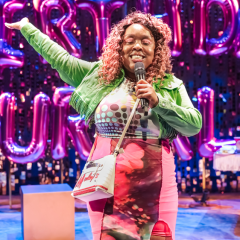In a follow up to my previous article on Shakespeare's relevance today, I wanted to touch on some of my favourite modern takes on his work. These pieces epitomise why I believe Shakespeare's use of language, structure and storytelling are still totally relevant in today's entertainment industry and education system.
Here are 5 examples of the best productions which display the best of modern Shakespeare!
Romeo and Juliet (1996)
It is referenced endlessly, but Baz Luhrmann’s 1996 film Romeo and Juliet sits on many top lists for good reason. For a start, the acting ability of the cast is very refreshing for a trendy 90s movie, let alone one that uses the original text of Shakespeare's script. Each actor seems to truly understand their motives for speaking, which is what ultimately makes their performance engaging and understandable. The set is beautiful, the perfect modern setting for families in feud, and people desperate to find purpose in their lives.
The visuals are stunning, but also offer realism and context to the story and its characters' homes. For example, the abandoned fairground offers the context of a land in conflict, one that has a solemn past and one which cannot be lived in the same way anymore. There is a sense of children growing up too fast, much in the case of Romeo and his friends. Another example is Juliet's bedroom. The glowing lights offer a warm, soft hue which represents Juliet's gentle nature, but when we look more closely we see just how littered the room is with statues of the Virgin Mary. This highlights the religious aspect of her character and reminds us that there is a very present trope of faith and higher power in Shakespeare's plays. Finally, the funeral setting is a show-stopping vision. The crosses and candles help to show the Capulets' wealth, religious dedication, but also offer a modern twist with the neon lights that form the shape of crosses. It also reflects the youth of the characters.
The music, as with many of the soundtracks in Baz Luhrmann's work, is an iconic feature of the film, with artists such as Radiohead, Des’ree and The Cardigans assisting the modern setting in which the characters find themselves. The ‘news broadcast’ acting as the prologue and the epilogue is also a lovely and relevant modern touch.
Much Ado About Nothing (2011)
In 2011, National Theatre staged a much-anticipated production of Much Ado About Nothing starring David Tennant and Catherine Tate in the comedic roles of Beatrice and Benedick. Both are well-respected actors individually, but since their appearances together on Doctor Who from 2006 to 2010, it was clear that the two made a very dynamic duo.
What made this production immensely successful and undeniably hilarious, was the comedic ability of Tennant and Tate. The whole cast was incredibly talented, but the roles of Benedick and Beatrice, as they do in the respective script, stole the show. There is definitely the assumption that only a certain audience can truly laugh at Shakespeare's comedies, whether it be snobbery, study or what have you, but the wonderful thing about this production was that the humour was universal. There was no reliance on slapstick or overacting, just a full understanding of the comedy in the original script and brilliant delivery.
Director Josie Rourke explains that her production was "set in 1980s Gibraltar... because of Gibraltar's role as a military base"; this "allows the company to suggest a tightly knit community" and to evoke "the lavish 1981 royal wedding of Charles and Diana, underpinning the play's examination of the appeal of fairytale romance and what constitutes real, lasting love". This allows the audience to apply the lessons and innuendos of the script to a situation that is in living memory, and thus, relate more to the production and likely find it even funnier. Another feature of the comedy of Shakespeare is the classic case of mistaken identity. With the 80s update, cardboard cut out masks of relevant public figures offer relatable comedy that makes sense in this environment. Disguises nowadays are a hard thing to pull off believably, so this is the perfect way to apply Shakespeare's tactic realistically.
The Hollow Crown (Richard III)
The Hollow Crown is a unique series of films broadcast by the BBC, which accumulate to a chronological development of Shakespeare’s histories that depict the War of the Roses. The first series covers Richard II, Henry IV (part 1 and 2), and Henry V. The second season, named The Hollow Crown: War of the Roses follows the aptly-named war between the house of Lancaster and the house of York, ending in the union of the white and red rose. I mention the series as a whole because it offers a timeline of the plays, along with the ability to put a name to a face, with the same actors playing the same characters throughout the series. The production is excellent, along with the star-studded cast.
Richard III is set in 1483 (when Edward IV died), and The Hollow Crown episode adheres to this time period. It was broadcast on BBC 1 in 2016, three years after Richard III’s body was discovered under a car park in Leicester, and we had the awaited confirmation of the King’s curvature of the spine. In the title role is Benedict Cumberbatch. Taken from the perspective of the villain himself, Richard III directs many of his ‘aside’ lines and occasional glances to the camera, breaking the fourth wall in the way that the theatre often does. It also allows the audience an insight into his way of thinking, making the story of this ‘villain’ more intriguing. In an interview with Cumberbatch detailing his experience with playing the role, the actor said: “There’s very little care for him. His deep-seated anger and hurt leads to his ambition and everything we know of him. That was our way into humanising him.”
Richard III (1995)
Ian McKellen has a lot of recognised work with Shakespeare’s plays and this 1995 film of Richard III is no exception. This film is another example of a very relevant update in the era, being set in a fictional 1930’s London, stylistically reminiscent of Nazi Germany and Hitler’s rise to power. The film depicts a fictional Civil War. Edward (Edward VI) is plotting his rise to the throne, and his younger brother Richard (to be Richard III) is leading his army. The general colour scheme in the film is red and black, which reflects the colours of the Nazi symbol. By updating this play to an event that lies in more recent memory, we can draw parallels to society in the past and society today.
Like the Hollow Crown adaptation, McKellen directs his ‘aside lines’ to the camera and uses the original Shakespeare text. McKellen’s portrayal of Richard III is much livelier in comparison to Cumberbatch’s. This Richard is seductive and charismatic, just as a politician needed to be. What is nice about seeing these contrasting portrayals is how much foundation Shakespeare lays down in his writing for truly complex characters that we can see in every area of our own lives. It also pays tribute to the actors who play them, offering new and unique interpretations that bring the text to life. It seems that in this particular film, Richard III is not necessarily portrayed to be an evil person, but as a product of how his family treats him. He has learnt his behaviour through his mistreatment. This supports Cumberbatch’s idea of how he managed to humanise the character in preparation for the role.
As a side note, one of the subtle features I liked about this film, which is also presented in Luhrmann’s Romeo and Juliet, is the use of metaphors for modern weaponry. For example, the guns in Luhrmann’s 1996 film are referred to as ‘swords’, with their names engraved on them. One of the guns is dropped on the floor which reveals the word ‘dagger’ engraved on the side. In the same way, a tank in this rendition of Richard III is referred to as a ‘horse’, fitting for the iconic line which represents Richard’s desperation “A Horse, A Horse, My Kingdom for a Horse!”
Othello (RSC 2015)
In 2015, director Iqbal Khan brought his production of Othello to the stage in Shakespeare’s hometown, Stratford-Upon-Avon. The summary on the RSC website states, “in an innovative twist, Khan cast two black actors, Hugh Quarshie and Lucian Msamati, as Othello and Iago. [...] set and lighting designer Ciaran Bagnall, and costume designer Fotini Dimou, [...] combined modernity with references to Venice’s rich history as a maritime superpower. Akintayo Akinbode’s evocative music was another crucial element in the play’s setting.”
As a white woman, I have not been subject to the racism that is displayed in this play, and it is not my place to comment on behalf of the characters. I will instead direct you to a fascinating interview with Hugh Quarshie (Othello), and a snapshot of an interview with Lucian Msamati (Iago). This choice lent a fascinating new insight on Iago’s intentions and deeper grudge against Othello, even though, as Quarshie suggests in the interview linked above, Shakespeare didn’t seem to spend any time on the finer details of Othello’s psychology as a human more than his psychology as ‘The Moor’. In light of this, I will direct you to another interesting conversation that offers some different viewpoints on Shakespeare’s place in South Africa. It explores how his work informs the education system of a country that only ended its apartheid system in 1994 with Nelson Mandela’s presidency, but still struggles with inequality. The programme is aptly named: Shakespeare in South Africa.
Do you agree with this list? Have you seen any of these adaptations, or are there any that you think I have missed? I am also interested to know if there would be any interest in the 5 worst modern takes on Shakespeare... Do let me know down below!









0 Comments